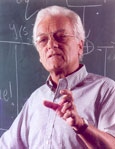2009 Monie A. Ferst Award
Petar Kokotovic is a professor emeritus of engineering at the University of California, Santa Barbara. He received his B.S. and M.S. from the University of Belgrade, Yugoslavia, and his Ph.D. from the Institute of Automation and Remote Control, USSR Academy of Sciences, Moscow. From 1959 to 1966, he worked as a control engineer at the Pupin Research Institute in Belgrade. He then joined the Department of Electrical and Computer Engineering and the Coordinated Science Laboratory at the University of Illinois, Urbana-Champaign, where he held the endowed Grainger Chair. In 1991 he moved to the Electrical and Computer Engineering Department at UC-Santa Barbara, where he directed the Center for Control Engineering and Computation until 2003. Kokotovic is known for several pioneering contributions to control engineering. He developed the sensitivity points method, a precursor to adaptive control, used for automatic tuning of industrial controllers. He introduced singular perturbation techniques for multi-time-scale design of control systems and flight trajectories, which found widespread applications. Kokotovic and coworkers identified the main forms of adaptive systems instability and introduced redesigns that made adaptive controllers more robust. He also initiated the development of a popular nonlinear recursive design known as ‘backstepping,’ now widely used in robust and adaptive nonlinear control. A longtime industrial consultant, Kokotovic contributed to the design of automotive computer controls at Ford and to power system stability analysis at General Electric. He has supervised 35 Ph.D. students and 25 postdoctoral researchers, most of whom have pursued successful academic or industrial careers. With them he co-authored numerous papers and eight books. Kokotovic is a Life Fellow of the IEEE, a Fellow of the International Federation of Automatic Control (IFAC) and a member of the National Academy of Engineering. He is the recipient of the three highest control engineering awards: 1990 IFAC Quazza Medal, 1995 IEEE Control Systems Field Award and 2002 AACC Richard E. Bellman Control Heritage Award.